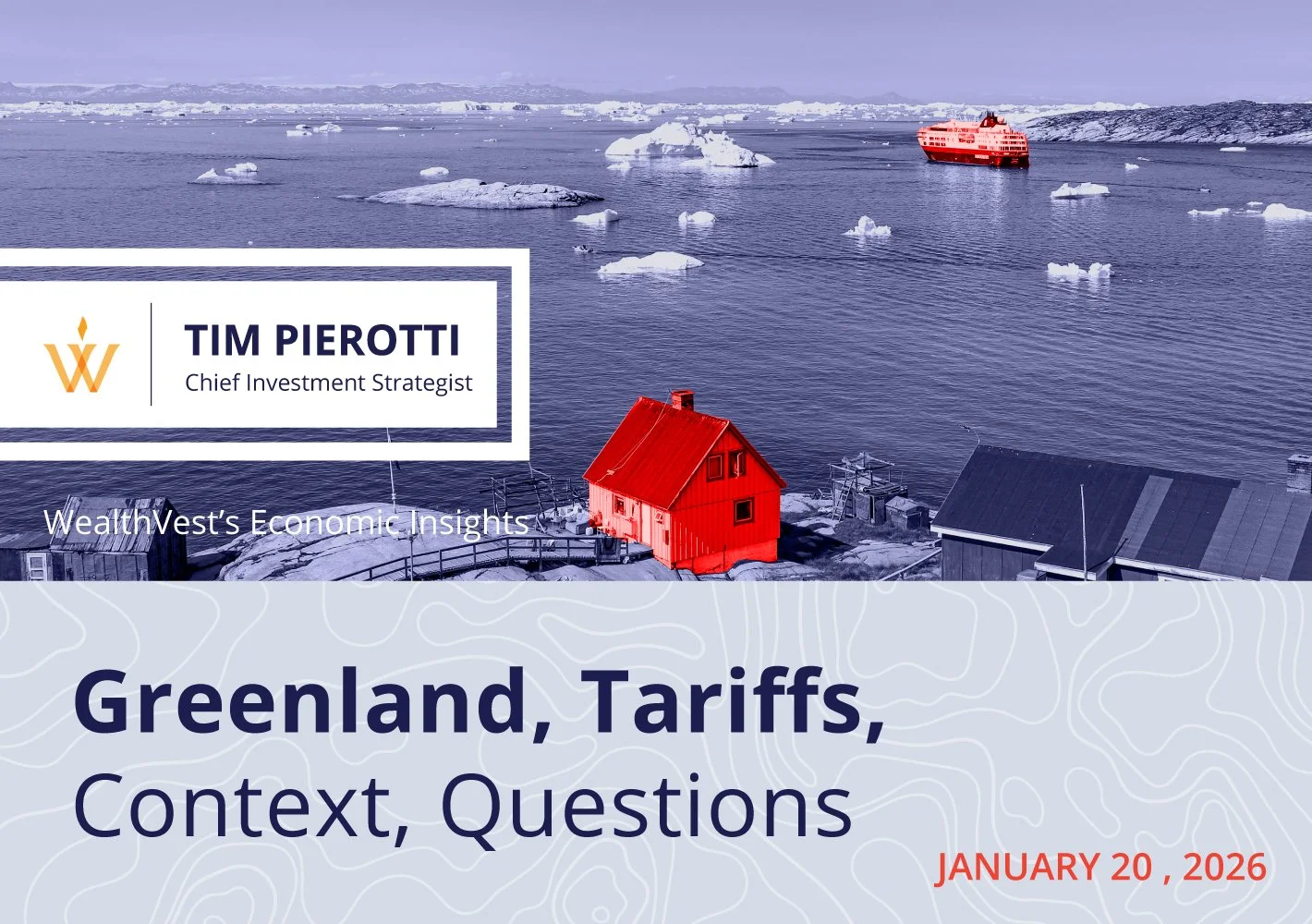Greenland, Tariffs, Context, Questions
The news upsetting markets this morning is the President’s announcement that he will impose punitive tariffs on European countries standing in opposition to the US acquisition of Greenland. S&P futures are looking down by about 1.5%. The dollar is weak as are Treasuries and the crypto complex. Risk off and sell US based assets is the trend of the morning. Gold is up and silver is parabolic. The world has come to take the President’s tariff threats seriously and seem to be anticipating that the Europeans are finally willing to take aggressive measures specifically against globally dominant US technology companies.
Pierotti For Fed Chair
Today, after much prayer and deliberation, I am launching my campaign to be the next Chairman of the Federal Reserve. Unlike the other candidates running for this office, I am running as a “Run it Cool” candidate. I know it’s a long shot given the President seems dead set on a candidate from the “Run it Hot” Party, but I think the President should hear me out, because the run-it-hotters might be good for markets near-term, but they sure aren’t going to help in the midterms.
‘Tis the Season of Forecasting Folly
“We see stocks rising 10% in 2026 to our new target of 7600 for the S&P (some will go to 8000 for the headline attention). We see earnings growing by 10-12% and we assume the earnings multiple to remain constant. We see the economy growing by 2-3% and for the US consumer to remain resilient. We do expect some volatility in markets, but we would be buyers on weakness. We expect the economic and inflationary impact of tariffs to fade next year and fiscal support from the “One Big Beautiful Bill” to support business investment. We believe that as inflation settles down, the Fed will cut two to three times. Our favorite sector remains mega-cap tech driven by the transformative and productivity-generating power of AI”
The Good and the Bad of a Third Fed Mandate
There is an old saying that I remember from my early days on Wall Street that “Only Fed Chairs who defeat inflation go to Heaven”. Given Chair Powell has allowed inflation to run above the 2% target for over four years, I’m not confident about his future ethereal direction of travel. In my experience over the years, at almost every FOMC press conference, Powell has sounded more dovish than I thought he would and has proven time and again to mistakenly underestimate the persistence of inflationary pressures.
Nothing but Bad Options for the Fed
Over the weekend, Renaissance Macro’s outstanding market economist Neil Dutta made a compelling argument that there is mounting evidence that a potential inflection in unemployment may be upon us.
Populism’s Economic Kryptonit
“Who are you going to believe, me or your lying eyes” Chico Marx
The Fed’s Employment Conundrum
Financial conditions are about as easy as they can be. The Fed is cutting rates and more cuts are expected. Some members of the Fed and the Treasury Secretary have successfully jawboned down the long-end of the Treasury market (and thereby mortgage rates) with talk of a “third mandate”.
WealthVest Taps Industry Veteran Kevin Beard to Lead Strategic Growth Initiatives for Broker-Dealer and Bank Partners
WealthVest has hired Kevin Beard, former Atria executive, to oversee and expand high-value partnerships with broker dealers, banks, credit unions and registered investment advisors.
Fed Cutting with Gold and Risk Assets Ripping
This morning the Atlanta Fed published their “Nowcast” for US economic growth in the third quarter. Historically, it has made sense to take these nowcasts with a grain of salt early in the quarter but later in the quarter, as we are now, these forecasts become more accurate.
WealthVest Partners with Institutional Securities Corporation to Distribute Structured Products
WealthVest, a leading financial services distribution firm, has announced a strategic partnership with Institutional Securities Corporation (ISC) to establish a dedicated, nationwide structured products wholesaling team. This new team will support bank investment programs, independent broker-dealers and registered investment advisors (RIAs).
Bad News is Good News for How Long?
Markets appear to be discounting an economy that is weak enough to allow the Fed to aggressively cut rates, but not so weak that a recession that would impact corporate earnings might be looming.
Key Quotes and Our Thoughts from Fed Minutes
We find the commentary hard to square with the market expectation of a cut in September. They may well cut, but it doesn’t sound like they think it’s a great idea.
Jackson Hole Looms Large
Jackson Hole is next week and Jerome Powell is between a rock and a hard place
WealthVest Globally Recognized as Great Place to Work in 2025
WealthVest, a Bozeman-based financial services wholesaling firm, announced they have earned the prestigious Great Place to Work CertificationTM. With the designation, WealthVest became one of just eight Montana-based companies recognized as a global leader in workplace culture, employee experience and leadership.
Free Money
Tim Pierotti dives into the differences between today's IPO speculation and retail enthusiasm and the reminiscent trends of 1999. The question looms: Are we on the brink of another bubble?
Housing Softness Serendipity
Sometimes bad is good and good is bad when it comes to markets and the economy.
The Ever-Widening Labor, Employer Mismatch
Two things can be true: This is a terrible job market for recent graduates and many other segments of the white-collar job market and yet nearly 40% of employers can’t fill open roles.




















